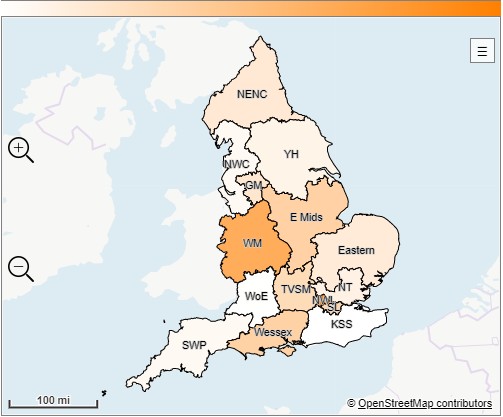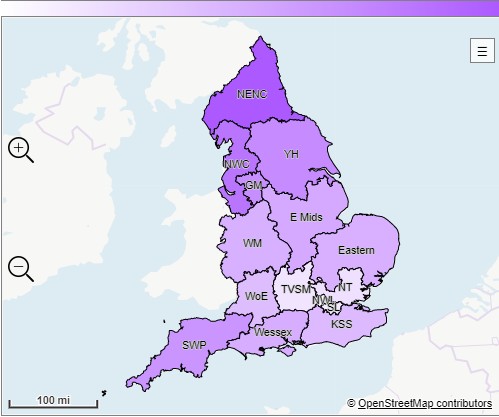Summary
- The Research for Patient Benefit (RfPB) programme is inviting proposals from eligible individuals and research teams for collaborative research projects to better understand and manage the health and social care consequences of Chronic Obstructive Pulmonary disease (COPD). We are particularly interested in populations in the North East of England (NE) where there is a high disease burden and which has been historically underserved by research activity.
- To support capacity building, all proposals to this call must include an early career researcher in the NE as a co-lead applicant.
- This call is an important part of the Programme's strategy to fund high-quality and timely evidence and to support research at the source of patient need. Through this highlight notice we are looking to support networking activities that will open up new cross- and inter- disciplinary research agendas and develop new national collaborations between researchers in the COPD research field.
- The call offers researchers considerable flexibility to focus on any subject area or topic providing that it falls within the COPD highlight notice remit. We particularly encourage ambitious and novel research proposals addressing new concepts and techniques and those with the potential for significant scientific or societal and economic impact, as well as developmental work potentially leading to such research.
- We are keen to encourage fresh ideas from new researchers and appropriate proposals are welcomed from those with limited research experience (early career researchers) when supported by an experienced, strong and multi-disciplinary team.
- Our funding decisions are based on a number of criteria including quality, timeliness, potential impact and value for money.
- The call is for proposals up to £350,000 for a period of up to three years.
- Proposals should be submitted to competition 45 under the highlight notice.
Scope
Proposals should be within RfPB scope and the scope of the COPD highlight notice.
Applications should be co-produced with service commissioners, providers and service users wherever appropriate to better ensure findings are of immediate utility in policy and practice. Applicants may wish to consult the NIHR guidance on co-producing research.
Remit
The RfPB programme is inviting proposals to investigate any aspect of the diagnosis, treatment, support or care of patients with COPD, including access to or the delivery of services. Research methods may involve primary research or evidence synthesis, including systematic reviews, modelling studies or the analysis of existing datasets.
Proposals have to clearly identify the research context of their proposal in terms of recent and currently funded UK and international research in the area and the potential impact of their proposed research for patients, carers and the NHS.
Themes of interest include but are not limited to:
- Treatment of COPD and exacerbations in adults, including: antibiotic therapy, use of systemic steroids, inhaled therapies for people with COPD including inhaled corticosteroid responsiveness, and strategies for optimising the delivery of non-invasive mechanical ventilation (NIV)
- Home-based management of COPD
- Pulmonary rehabilitation during hospital admission for exacerbation and/or in the early recovery period
- Ways to better support COPD patients to tell the difference between an exacerbation and day-to-day symptom variation.
These themes have been based on the research priorities identified by the National Institute for Health and Care Excellence and the European Respiratory Society and in consultation with the leading respiratory medicine experts.
Research following patient need
The focus of this highlight notice is to study populations with a high disease burden and which have been historically underserved by NIHR research activity. We plan to do so by facilitating national collaborations and by bringing COPD research expertise to places with high disease prevalence. Special consideration should be given to inclusion of socioeconomic and other hard-to-reach and/or disadvantaged groups that are more affected by COPD.
Analysis of COPD prevalence and research activity
The tables and maps below illustrate the mismatch between level of regional research activity (measured by patient recruitment per 100,000 patients) and prevalence of COPD in England in the past 10 years (2010-19).
The recruitment per 100,000 prevalence map shows where the highest proportion of people with COPD are being recruited to COPD studies. This map show that COPD research activity levels are highest in North West London and the West Midlands. However, the weighted prevalence map shows that COPD is most prevalent in the North East and North Cumbria and in the North West Coast.
Recruitment per 100,000 prevalence
This table and map show where the highest proportion of people with COPD are being recruited into COPD studies. On the map, areas of highest recruitment per 100,000 prevalence are shown in dark orange, with the shade becoming paler as recruitment per 100,000 prevalence drops.
| Local Clinical Research Network region | Recruitment | Prevalence | Recruitment per 100,000 prevalence |
|---|---|---|---|
| North West London | 2,033 | 24,496 | 8,299.3 |
| West Midlands | 6,347 | 117,264 | 5,412.6 |
| East Midlands | 2,926 | 95,014 | 3,079.5 |
| Wessex | 1,757 | 58,145 | 3,021.8 |
| South London | 1,258 | 44,523 | 2,825.5 |
| Thames Valley and South Midlands | 829 | 34,091 | 2,431.7 |
| Greater Manchester | 1,251 | 73,917 | 1,692.4 |
| North East and North Cumbria | 1,371 | 88,691 | 1,545.8 |
| Eastern | 1,110 | 77,333 | 1,435.4 |
| North Thames | 818 | 83,418 | 980.6 |
| Yorkshire and Humber | 1,205 | 135,395 | 890.0 |
| North West Coast | 597 | 107,103 | 557.4 |
| South West Peninsula | 274 | 51,736 | 529.6 |
| West of England | 83 | 42,843 | 193.7 |
| Kent, Surrey and Sussex | 140 | 85,607 | 163.5 |
| England total | 21,999 | 1,119,576 | 1,964.9 |

Weighted prevalence per 1,000 population
This table and map show where COPD is most prevalent in England in the past 10 years (2010-19). On the map, areas of highest prevalence per 1,000 population are shown in dark purple, with the shade becoming paler as recruitment prevalence drops.
| Local Clinical Research Network region | Prevalence | General population | Weighted prevalence (per 1,000 population) |
|---|---|---|---|
| North East and North Cumbria | 88,691 | 3,088,379 | 28.7 |
| North West Coast | 107,103 | 4,187,282 | 25.6 |
| Yorkshire and Humber | 135,395 | 5,858,143 | 23.1 |
| Greater Manchester | 73,917 | 3,252,533 | 22.7 |
| South West Peninsula | 51,736 | 2,354,579 | 22.0 |
| East Midlands | 95,014 | 4,812,818 | 19.7 |
| Wessex | 58,145 | 3,033,463 | 19.2 |
| West Midlands | 117,264 | 6,185,101 | 19.0 |
| Eastern | 77,333 | 4,085,704 | 18.9 |
| Kent, Surrey and Sussex | 85,607 | 4,814,220 | 17.8 |
| West of England | 42,843 | 2,444,032 | 17.5 |
| North Thames | 83,418 | 6,148,698 | 13.6 |
| Thames Valley and South Midlands | 34,091 | 2,594,123 | 13.1 |
| South London | 44,523 | 3,618,023 | 12.3 |
| North West London | 24,496 | 2,429,144 | 10.1 |
| England total | 1,119,576 | 58,906,242 | 19.0 |

Call details
Requirements for applications submitted under the highlight notice
- The notice is open to researchers at all career stages from across England and standard eligibility rules will apply as detailed in the applicant guidance.
- To encourage early career researchers* (ECR) to lead on RfPB awards, we require ECRs from the NE region to be included as either the lead applicant or joint lead applicant. ECRs will have to be supported by a senior researcher (who may be from outside of the North East) who will act as joint-lead applicant, supported by a strong research team. So if you intend to apply under this highlight notice but you are not an ECR you will need to partner with such a researcher based in the North East region to co-lead the project with you.
- We expect the host institution to be in the North East region.
- We expect the lead applicant to establish national collaborations with research organisations outside the North East region, where appropriate.
- Patient recruitment to the study must take place from the North East region, however this can be in conjunction with sites located in other regions. The choice of recruitment regions and sub-localities has to be justified in relation to the size of patient burden. Applicants are advised to use a mapping tool, such as the Research Targeting Tool, to demonstrate how the planned recruitment sites fit with prevalence/patient burden. The platform is open to anyone who has an NHS email address or University email address. For more information about the tool please contact crnspecialtyclusterb@nihr.ac.uk
*For this highlight notice we consider any researcher who has not yet been the principal investigator for a substantial award (£100,000+) to be an early career researcher.
Funding
The call is for applications up to £350,000 (100% direct costs for NHS and 80% full Economic Cost (fEC) for HEI) for a period of up to three years. Detailed information on eligible costs can be found in the RfPB’s Finance guidance.
The call launch and networking event
RfPB held a COPD highlight notice launch and networking event on 7 December 2020. An event summary and recording are available.
How to apply
RfPB competition 45 is inviting applications on this highlight notice.
Applicants must submit an online application via the NIHR's Research Management System (RMS) by 14 July 2021. To assist the Programme Secretariat in preparing for peer review, research teams should submit an Expression of Interest (EoI) form by 14 June 2021, ahead of submitting a full application.
Assessment process and criteria
The applications submitted under the highlight notice will undergo routine scrutiny along with other applications submitted to Competition 45. Proposals submitted under the highlight notice will be assessed on their quality and individual merits according to standard RfPB scheme criteria. Reviewers will also be asked to consider fit to the highlight notice including collaborative approach and justification for recruitment site(s).
The standard RfPB two stage application process will apply to proposals submitted under this notice. Templates of Stage 1 application form and Stage 2 application form are available.
Proposals will be reviewed firstly by the Programme Secretariat for fit to scope and eligibility. Eligible applications within scope of the RfPB programme and the COPD highlight notice will then be reviewed by a Regional Advisory Committee (RAC) and external peer reviewers.
RAC will make recommendations on outcomes to the Department of Health and Social Care (DHSC). Applicants will have an opportunity to respond to feedback provided by the Committee at Stage 1 and where clarifications and/or changes are required as part of the award process.
Key assessment criteria for the submissions will include:
- The potential for the proposal to provide a unique value-added research against the Programme and the highlight notice scope to better understand and manage the health and social care consequences of Chronic Obstructive Pulmonary disease (COPD) with a clear trajectory to patient benefit.
- Justification for the selection of patient recruitment sites (if relevant)
- Quality of the research proposed
- Significance and potential benefit to the NHS and its patients
- Value for money provided by the application.
The decisions of the Committee will not be open to appeal and the funders reserve the right to amend the application process.
Call timetable
| Activity | Date |
|---|---|
| Competition 45 launch | 24 March 2021 |
| Expression of Interest (EoI) deadline | 14 June 2021 |
| Competition close | 14 July 2021 |
| Invited to Stage 2 decision | October 2021 |
| Funding decisions | March 2022 |
Please contact rfpb@nihr.ac.uk for further queries.

